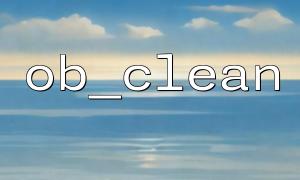In PHP development, the ob_clean() function is used to clear the output buffer, which is a common practice during debugging and performance optimization. However, in certain situations, you might encounter the following error message:
Warning: Cannot modify header information - headers already sent by (output started at /path/to/script.php:xx) in /path/to/script.php on line xx
This error indicates that even though you've called ob_clean() to clear the buffer, PHP is still unable to modify the HTTP header information. This is because PHP automatically sends HTTP headers as soon as any output is sent (including HTML, spaces, error messages, etc.). Since headers must be sent before any output, if output has already started, PHP can no longer send or modify headers.
HTTP headers are essential metadata passed with HTTP requests and responses. For example, setting cookies, redirecting to another page, or controlling cache behavior is all done through HTTP headers.
PHP provides the header() function to modify or add HTTP headers. However, this function must be called before any output is sent; otherwise, you'll encounter the "headers already sent" error.
The ob_clean() function is part of PHP's output buffering system and is used to clear the output buffer. This is typically helpful when handling large amounts of output to prevent prematurely sending content that would block subsequent header modifications.
However, ob_clean() does not affect content that has already been sent to the browser. If any output has occurred before the ob_clean() call, the headers still can't be modified.
Common causes of the "headers already sent" error include:
Any output—HTML or plain text—will cause PHP to send headers automatically, meaning you can’t modify headers afterward.
Check your PHP script to ensure nothing is output before calling the header() function. This includes:
To avoid output buffer issues, you can call ob_start() at the start of your script. This ensures PHP buffers all output and sends it in one go at the end, preventing header-related errors.
<?php
ob_start();
header('Location: https://www.example.com');
ob_clean();
// Your logic here
ob_end_flush(); // Sends the output buffer content
?>
Similar to ob_clean(), ob_end_clean() clears the buffer but also closes it. This prevents any buffered content from being sent to the client, ensuring that subsequent headers can still be set properly.
<?php
ob_start();
header('Content-Type: text/html; charset=UTF-8');
// Clear and close the buffer
ob_end_clean();
// Continue script processing
?>
If the issue persists, try tracing all output sources to pinpoint the problem. Make sure no unexpected output occurs before the header() call. You can use debugging tools or logging to help identify these outputs.
While ob_clean() is useful for clearing the output buffer, it only affects content not yet sent to the browser. If any output has already occurred before calling header(), you'll still face the "headers already sent" error. By starting output buffering with ob_start() and ensuring no premature output is sent, you can effectively prevent these issues.
Understanding and correctly using PHP's output buffering mechanisms will help you better manage HTTP headers and output content, allowing you to write more robust and efficient PHP applications.




